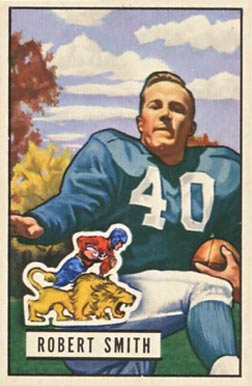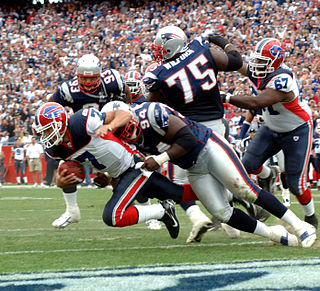
The All-America Football Conference (AAFC) was a major professional American football league that challenged the established National Football League (NFL) from 1946 to 1949. One of the NFL's most formidable challengers, the AAFC attracted many of the nation's best players, and introduced many lasting innovations to the game. However, the AAFC was ultimately unable to sustain itself in competition with the NFL. After it folded, three of its teams were admitted to the NFL: the San Francisco 49ers, the Cleveland Browns and the original Baltimore Colts.

Bruce Bernard Smith is an American former professional football defensive end who played in the National Football League (NFL) for 19 seasons, primarily with the Buffalo Bills. He played college football for the Virginia Tech Hokies, where he was a twice All-American, and was selected with the first overall pick by the Bills in the 1985 NFL draft.
Throughout its history, the National Football League (NFL) and other rival American football leagues have used several different formats to determine their league champions, including a period of inter-league matchups to determine a true national champion.
For its first nine seasons, 1960 through 1968, the American Football League determined its champion via a single playoff game between the winners of its two divisions.

The 1999 Stanley Cup Finals was the championship series of the National Hockey League's (NHL) 1998–99 season, and the culmination of the 1999 Stanley Cup playoffs. It was contested by the Eastern Conference champion Buffalo Sabres and the Western Conference champion Dallas Stars. It was the 106th year of the Stanley Cup being contested.
The history of the Buffalo Bills began in 1960, when the team began play as a charter member of the American Football League (AFL), winning two consecutive AFL titles in 1964 and 1965. The club joined the National Football League (NFL) as part of the 1970 AFL-NFL merger. The Bills have the distinction of being the only team to advance to four consecutive Super Bowls between 1990 and 1993, but also the regrettable distinction of losing all four of them.

The 1949 Cleveland Browns season was the team's fourth and final season in the All-America Football Conference (AAFC). The Browns finished the regular season with a 9–1–2 win–loss–tie record and beat the San Francisco 49ers to win their fourth straight league championship. In the season's sixth game on October 9, the 49ers stopped the Browns' professional football record unbeaten streak at 29 games. It began two years earlier on October 19, 1947, and included two league championship games and two ties.
The 1964 AFL season was the fifth regular season of the American Football League.
The 1964 AFL Championship Game was the American Football League's fifth championship game, played at War Memorial Stadium in Buffalo, New York, on Saturday, December 26.

James Robert Smith was an American football defensive back, halfback and punter. He played in the National Football League (NFL) for the Detroit Lions from 1949 to 1954. He played for NFL championship teams in Detroit in 1952 and 1953 and was selected as a first-team All Pro after the 1952 season. He also played in the All-America Football Conference (AAFC) for the Buffalo Bills (1948), Brooklyn Dodgers (1948), and Chicago Hornets (1949). Smith played college football for the Tulsa Golden Hurricane, the Iowa Pre-Flight Seahawks (1944), and the Iowa Hawkeyes (1946–1947).

Richard Gale Rifenburg was an American football player and a pioneering television broadcaster for the forerunner to WIVB-TV in Buffalo. He played college football for the University of Michigan Wolverines in 1944 and from 1946 to 1948. He was a consensus selection at end on the 1948 College Football All-America Team. Rifenburg played professionally in the National Football League (NFL) with the Detroit Lions for one season in 1950. After retiring from football he settled in Buffalo and became a sports broadcaster. He worked as a color commentator and as a play-by-play announcer for the Buffalo Bulls. He hosted various television and radio sports shows and was eventually inducted into the Buffalo Broadcasters Hall of Fame.
The 1973 Buffalo Bills season was the 14th season for the team and their 4th season in the National Football League (NFL). The Bills finished in 2nd place in the AFC East division and finished the 1973 NFL season with a record of 9 wins and 5 losses, the team's first winning record since 1966.
The 1969 Buffalo Bills season was the team’s tenth season, and was the final season of the American Football League before the 1970 AFL-NFL Merger. The Bills played an AFL-record seven games against opponents that went on to reach the postseason; Buffalo lost all seven of these games.
The 1963 Buffalo Bills season was the team’s fourth season in the American Football League. Winless after their first four games, Buffalo won seven of the final ten games, including the final two over the New York Jets, to finish with their second-consecutive 7–6–1 record, tied with the Boston Patriots atop the Eastern division. In this era, this required a tiebreaker playoff, the AFL's first. The Patriots and Bills had split their season series, each team winning at home, and the Bills were slight favorites as playoff hosts.
The 1970 Buffalo Bills season was the franchise's first season in the National Football League, and eleventh overall. The team looked to improve on its 4–10 record from 1969 and make the playoffs for the first time since 1966. However, the Bills started out on the wrong foot, losing four of their first five games. After winning two consecutive road games against the Patriots and Jets and suffering a blowout loss to the Cincinnati Bengals, the Bills and Colts played to a 17–17 draw in week 9, Buffalo's first tie since 1968. The Bills would then lose five straight to end the season and finished 3–10–1, for fourth place in the AFC East. Their Week 5 game against the Miami Dolphins would start an era of futility during which the Bills would lose twenty consecutive games against the Dolphins. The Bills would not defeat the Dolphins at any point during the 1970s and next beat Miami in 1980. This would become known as "The Streak".

The Bills–Patriots rivalry is a National Football League (NFL) rivalry between the Buffalo Bills and New England Patriots.

Buffalo, New York, and its greater metropolitan area is currently home to two major league sports teams, the Buffalo Sabres & Buffalo Bills. Buffalo is also home to several other major and minor league sports teams, including the Buffalo Bandits, Buffalo Bisons, Buffalo eXtreme and FC Buffalo. Local colleges active in NCAA Division I athletics include Canisius University, Niagara University, St. Bonaventure University and University at Buffalo.

Joshua Patrick Allen is an American professional football quarterback for the Buffalo Bills of the National Football League (NFL). He played college football for the Wyoming Cowboys and was selected seventh overall by the Bills in the 2018 NFL draft.
The 1946 AAFC season was the first season of the All-America Football Conference, a new professional league established to challenge the market dominance of the established National Football League. The league included eight teams, broken up into Eastern and Western divisions, which played a 14-game official schedule, culminating in a league championship game.
The 1949 Buffalo Bulls football team was an American football team that represented the University of Buffalo as an independent during the 1949 college football season. In its second and final season under head coach Frank Clair, the team compiled a 6–3 record. The team played its home games at Civic Stadium in Buffalo, New York.









